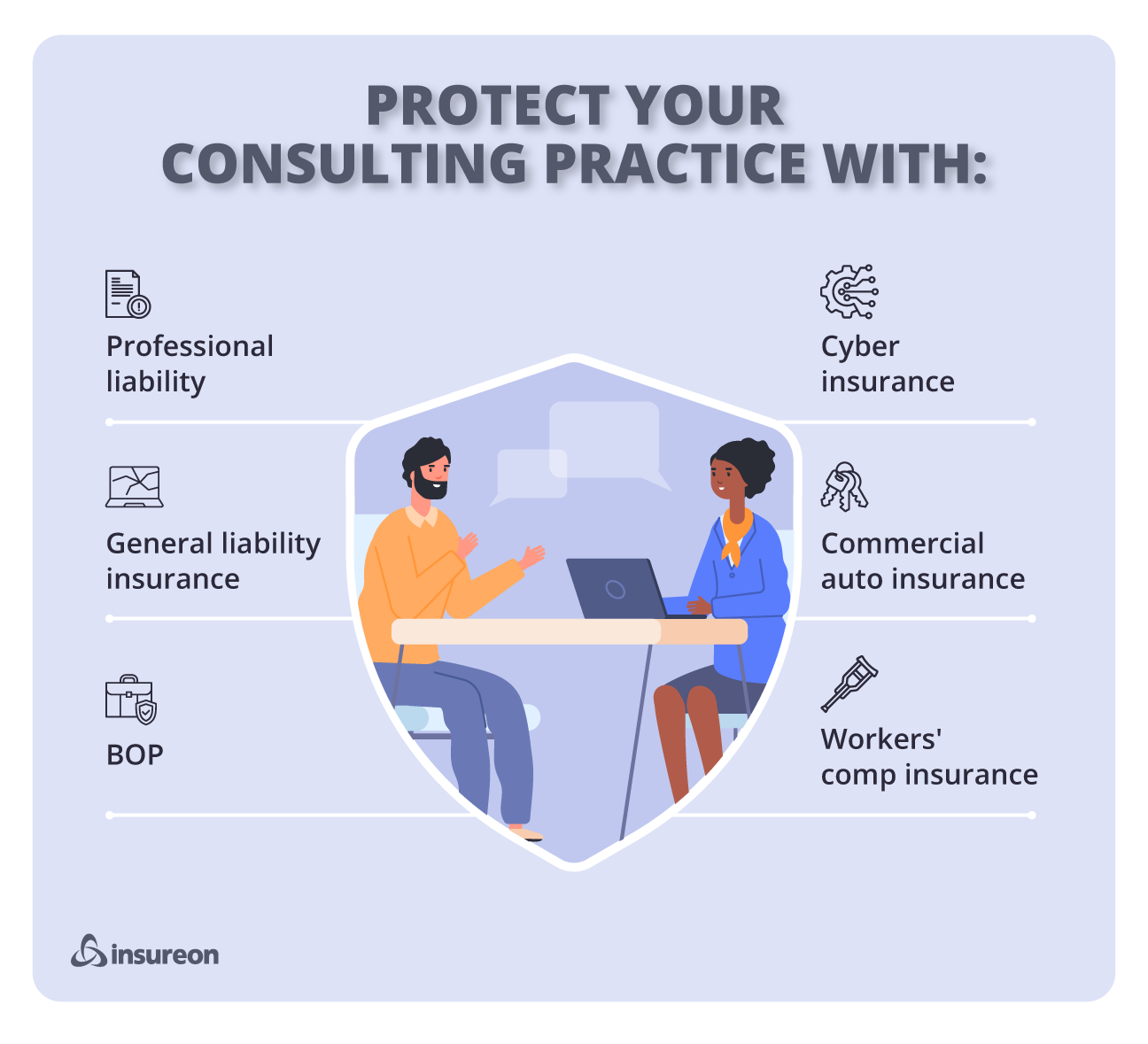
Top consulting professionals we insure
Recommended business insurance policies for consultants
Whatever your field of expertise, an accident or error in judgment can lead to a devastating lawsuit. Insureon helps consultants secure policies that protect you from legal expenses, medical bills, and other unexpected costs.
Professional liability insurance
This policy is also called errors and omissions insurance, or E&O. It covers legal expenses if a client sues a consultant over unsatisfactory results, errors, or delayed work.
- Erroneous advice
- Consulting mistakes and oversights
- Accusations of negligence
General liability insurance
This policy covers basic consulting business risks, such as customer property damage and injuries. Bundle with property insurance for savings in a business owner’s policy.
- Slip-and-fall accidents
- Damaged customer property
- Libel or slander lawsuits
Business owner’s policy
A business owner’s policy, or BOP, combines general liability insurance with commercial property insurance, typically at a lower rate than if the policies were purchased separately.
- Customer injuries
- Damaged customer property
- Damaged business property
Workers’ compensation insurance
Workers’ comp is required in almost every state for consulting firms that have employees. It also protects sole proprietors from work injury costs that health insurance might deny.
- Employee medical expenses
- Disability benefits
- Lawsuits over employee injuries
Cyber insurance
This policy helps consultants survive data breaches and cyberattacks by paying for the cost of notifying affected clients, legal fees, and other related expenses.
- Data breach lawsuits
- Notification of affected clients
- Fraud monitoring costs
Commercial auto insurance
Commercial auto insurance covers costs if a consulting business's vehicle is involved in an accident. Most states require this coverage for vehicles owned by a business.
- Property damage caused by your vehicle
- Auto accident injuries
- Vehicle theft and vandalism
How much does consultant insurance cost?

Small consulting firms can often find affordable insurance.
Several factors affect the cost of consultant insurance, including:
- Type of consulting services offered
- Claims history
- Business property and equipment
- Business income
- Where your business operates
- Type of insurance or bonds purchased

How do I get consulting business insurance?
It’s easy to get small business insurance for your consulting practice, including professionals like career coaches, event planners, and market research analysts, if you have your company information on hand. Our application will ask for basic facts about your business, such as revenue and number of employees.
You can buy a policy online and get a certificate of insurance with Insureon in three easy steps:
- Complete a free online application
- Compare insurance quotes and choose a policy
- Pay for your policy and download a certificate for proof of insurance
Insureon’s licensed insurance agents work with top-rated U.S. companies to find the right insurance coverage for your consulting business, whether you work independently or run a consulting firm.
Verified business insurance reviews
Hear from customers like you who purchased small business insurance.
Common questions about consulting business insurance
Do I need business insurance if I’m self-employed?
If you’re a self-employed consultant, you might not be required by law to carry insurance. However, having coverage can help you fulfill the terms of a contract, boost your credibility, and protect your business from financial risks.
Depending on your line of work, your state might require you to carry professional liability insurance to provide consulting services or work at certain facilities.
Your personal auto and health insurance policies likely won’t cover work-related incidents, such as a car collision involving a business-owned vehicle or an on-site work injury. That means you might have to pay hefty medical bills or state penalties for not having the proper insurance. If you drive your own vehicle for work, you may want to consider hired and non-owned (HNOA) insurance.
Carrying a workers’ compensation plan, even if you have no employees, can financially protect you if you’re unable to work due to an on-the-job injury or illness, as well as cover your medical expenses.
What other coverage do I need for my consulting company?
Several additional insurance policies for consultants can safeguard you and your business from common risks and the resulting financial losses.
- Business interruption insurance: A business interruption policy covers financial losses if your business is forced to close temporarily due to a fire or extreme weather. It can often be added to a business owner's policy.
- Hired and non-owned auto (HNOA) insurance: An HNOA policy provides liability protection for sole proprietors who drive their own vehicle for work, or a leased or rented vehicle.
- Commercial umbrella insurance: Umbrella insurance covers legal expenses when the limit is reached on another liability policy, such as general liability or commercial auto insurance. Sole proprietors may need this coverage to meet client requirements for higher liability limits.
- Fidelity bonds: Should an employee commit fraud or theft under your business name, a fidelity bond would cover the cost of reimbursing your customer. However, your business would have to repay the insurance company for the cost of the claim.
Should I get a professional consulting certification?
There are consultants in almost every industry, offering guidance to clients on a range of subjects, including education consulting, marketing consulting, and research consulting.
Whether you're just starting your consulting business or have tenure in your field, continuing to grow your skill set is key for standing out from the competition. While professional certificates aren't typically required for consultants, they can help you acquire skills to provide better services to your clients.
Here are a few examples of certifications available to consultants:
- IT consultant certification. Most certification programs focus on specialties, like Amazon Web Services (AWS), Microsoft technology, web app development, and big data.
- Project management certification. The Project Management Professional (PMP) certification provides you with the right skills to manage projects through three different approaches: agile, waterfall, and hybrid.
- Marketing consulting certification. You can acquire certifications in marketing management, content marketing, and sales management, as well as other marketing-specific strategies like digital marketing.
Read more about the different types of consulting certifications and why consultants should strengthen their credentials with professional certifications.
How can I save money on consulting business insurance?
Start by getting free business insurance quotes through Insureon’s online portal. Our licensed insurance agents can help make sure you get the right coverage at the most affordable price for your consulting business. Most small businesses can get insured and download a certificate of insurance within 24 hours of applying for quotes.

Want free expert advice right in your inbox?
By entering your email address and subscribing, you agree to our Terms of Use and Privacy Policy
Read our blog posts



As a business associate, you may have HIPAA liability if healthcare businesses hire you, or if you perform services involving Personal Health Information (PHI). Because HIPAA violations can lead to...






















